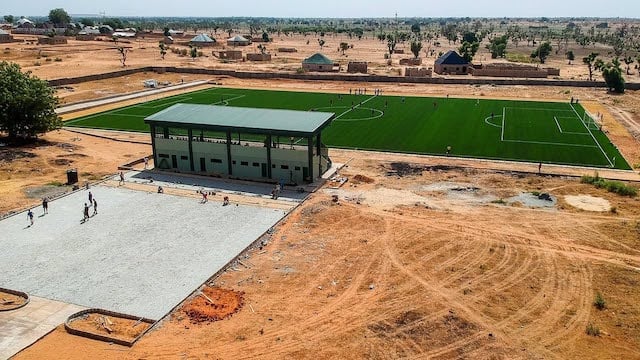At the heart of the Nigerian Football Federation financial controversies sits a simple question that cuts through noise and politics, where did development money go and what did it build for Nigerian football. In recent days that question has become louder, as lawmakers, former administrators, and local football officials offer competing narratives about FIFA and CAF funds, the much-debated Kebbi Goal Project, and what transparency should look like in a critical World Cup playoff window for the Super Eagles.
What triggered the storm
Nigeria’s House Committee on Sports opened a sharper line of inquiry into the Nigeria Football Federation after fresh public outrage over images of the Kebbi facility and questions about value for money. Committee chairman Hon. Kabiru Amadu said the NFF will be summoned to present a full accounting of grants and spending, with particular attention on FIFA Goal Projects in Kebbi and in Oyo State where the status remains unclear.
Amadu framed the intervention as a push for clarity rather than a witch-hunt. He spoke to the larger frustration felt by fans and stakeholders, noting that development grants are meant to lift infrastructure and grassroots programmes, and that missteps risk undermining the country’s football reputation internationally. The committee wants receipts, contractor details, and progress reports, a demand that reflects a growing appetite for accountability in sports governance.
What the House says it wants to see
At the National Assembly, Amadu spelled out the essence of the probe, an insistence on precise figures and traceable projects. He highlighted the need to reconcile conflicting reports about how FIFA funds have been deployed and who handled the projects, a through line that has defined public debate since the Kebbi photos surfaced online and sparked questions about quality and spending.
“We have seen and heard many conflicting reports regarding FIFA funds. Nigerians deserve to know exactly how much was received, what projects were executed, and who handled them.”
The House inquiry lands at a sensitive moment, with the Super Eagles preparing for a crucial World Cup playoff. Calls for stability and transparency are rising around the team, and the committee argues that a credible audit of development grants can help restore confidence in the system that supports elite performance.
Amaju Pinnick pushes back
Former NFF president Amaju Pinnick has dismissed allegations that the Kebbi project is a case study in mismanagement. He says the criticism is misplaced and politically charged, stressing that FIFA’s process leaves little room for diversion of funds and that the Kebbi build followed due process under FIFA oversight from planning to approval and certification.
“These claims are completely false and without merit. FIFA maintains strict oversight of all Goal Projects, from planning to completion. Every dollar spent is audited and accounted for. The Kebbi facility followed due process, and the project was duly approved, monitored, and certified by FIFA.”
Pinnick also pushed back against online comparisons with a 60,000 capacity build in Kenya, arguing that the projects are different in scope and scale. “The Kebbi project is a FIFA technical centre, not a government mega-stadium,” he explained, a distinction that goes to the heart of cost, design, and expectations. He added that no funds beyond the approved 1.2 million dollars allocation were requested or disbursed, even after COVID-19 delays.
Peter Obi’s broader charge
The political conversation widened when Peter Obi criticized what he described as entrenched corruption in sports and a heartbreaking reflection of a deeper national malaise. He referenced images of the Kebbi project and said the optics did not match the reported spending. Obi also recalled that Awka had once been listed among proposed FIFA-funded sites, only for his administration to build a stadium there independently when nothing materialized.
“FIFA’s recent revelation about the mismanagement of funds released to Nigeria’s Football Federation for stadium development and youth talent growth is both sickening and shameful. It mirrors the broader decay in how our scarce national resources are handled.”
Obi argued that about 25 million dollars has reportedly flowed to the NFF from FIFA and CAF since 2013, yet there is little to show for it. He called for transparency, urging leaders to embrace integrity across sectors, including sports, and insisted that Nigeria must demand accountability to move forward. His description of the Kebbi build as a national embarrassment crystallized a sentiment that many fans feel when images do not align with expectations.
Pinnick answers Obi and stresses process
Pinnick responded by doubling down on the integrity of the FIFA monitoring framework, saying every released dollar is tracked. He described the uproar as a misunderstanding amplified by misinformation and said he reached out to Obi to offer context on how Goal Projects are financed and audited.
“There was no mismanagement whatsoever. FIFA has a strict monitoring and auditing system that ensures every dollar released for Goal Projects is tracked.”
He attributed delays to logistical and bureaucratic challenges rather than corruption and maintained that the project remains under construction with delivery as intended. In a period where the Super Eagles need calm, Pinnick’s message was that scrutiny is welcome but should be grounded in how the FIFA Forward Programme actually works.
Kebbi FA chief insists the facility works
From within Kebbi, the local Football Association chairman, Abubakar Ladan, rejected claims that the project was abandoned or substandard. He said the stadium was completed, certified, and already in regular use, arguing that many critics rely on pictures taken out of context rather than on-site evaluations.
“People making these claims have not even visited the stadium. They rely on pictures taken out of context. The project was delivered, inspected, and certified in line with FIFA’s expectations.”
Ladan added that the facility has hosted youth championships, women’s fixtures, and state competitions, and that it served as the home ground for Kebbi United FC last season. He urged the public to avoid politicizing development and reiterated that FIFA disburses funds under strict supervision, a point meant to counter the narrative that NFF officials diverted money.
Oyo questions and the bigger picture
While Kebbi has consumed the spotlight, lawmakers say a FIFA-funded facility in Oyo State also needs clarification. The committee wants to see contractor information, progress reports, and official records to verify where and how funds were applied. The request underscores a broader issue, a need to track not only finished products but also the paper trail of delivery.
In practice, that will mean more than public statements. It will require transparent documentation that can reconcile the competing claims of completion, certification, and usage against images that stoked outrage. If handled thoroughly, the House process could reset standards for how development grants are explained to the Nigerian public.
Why the stakes feel higher now
These debates are unfolding as the Super Eagles chase a ticket to the 2026 World Cup. Momentum and trust matter in these windows, because the national team is the most visible face of the football ecosystem. Uncertainty at the top can filter down, shaping everything from training camps to public support during a critical playoff against Gabon on November 13.
That is why different voices keep returning to the theme of stability. Even as they disagree on what happened in Kebbi, stakeholders are unanimous that the national side must be shielded from governance turbulence. The committee’s insistence that this probe is not political, and the calls from former administrators to block out distractions, speak to a shared desire for focus on the pitch.
Youth development enters the chat
Financial oversight is one side of the story, technical direction is another. A Swiss-based Nigerian coach, identified as Adeyemi, has urged a complete overhaul of the youth system, arguing that modern football demands data-driven, scientific coaching rather than the recycling of outdated methods. He tied recent U17 struggles to a failure to modernize and to the need for coaches who can analyze performance trends and design age-appropriate development pathways.
“Until our local coaches upgrade their game technologically, the team will not progress.”
For Adeyemi, Nigeria’s past youth success existed in a different landscape, one before stricter age verification and tighter global standards. His warning is stark, if youth teams falter repeatedly, the Super Eagles will feel the consequences in the talent pipeline. It is a reminder that money, facilities, and methodology must sit together to build lasting success.
Reading the claims side by side
The timeline of the Kebbi debate is instructive. After FIFA shared an image of the half-completed site on social media in 2023, the outrage moved quickly from optics to accusations. Pinnick says process and audits are intact, that the technical centre label changes expectations, and that delays were administrative rather than criminal. Ladan says the project is complete and active, with competition hosted and a club tenant.
On the other side, Obi demands a deeper accounting of the money that has entered Nigerian football since 2013 and wants proof of outcomes across the map. The House Committee seeks similar clarity through formal channels, looking beyond headlines to vouchers and progress logs. Between those positions lies the test of credibility, a test the NFF must pass if it is to restore trust on and off the field.
What a credible audit should settle
Fans do not need perfect projects, they need honest ones. A credible audit should confirm the total inflows from FIFA and CAF, list every contracted project, show budgets and milestones, and document independent certifications. It should verify whether Kebbi, Oyo, and other sites match their blueprints, whether cost variances were justified, and whether usage aligns with intended outcomes.
Done right, this would provide a template for future communication, making it easier for administrators to explain what a technical centre is, how much it costs, and why it looks different from a mega stadium. It would also allow lawmakers to separate political noise from operational reality, a separation that would serve the Super Eagles and the grassroots with equal importance.
The human side of the ledger
Nigerian football’s emotional core is not a balance sheet, it is the child idolizing the Super Eagles badge, the young girl playing in a state competition, the coach on a dusty pitch trying to teach pressing and angles. That is why pictures of unfinished structures sting, because they collide with dreams that feel fragile when institutions do not answer basic questions.
Equally, if a facility in Kebbi is indeed functional and certified, that should be visible to all. Tours, schedules, match logs, and accessible documentation would help bridge the gap between claims and lived experience. If the game is truly for the people, then the ledger must be open, and the benefits must be felt in training sessions, tournaments, and careers that rise.
What to watch next
The House Committee’s next steps will be pivotal. A formal invitation to the NFF leadership, a document-backed review of Kebbi and Oyo, and a clear public briefing would be a strong start. If the committee produces a timeline, a list of contractors, and a summary of verified expenses, the conversation can move from insinuation to evidence.
For the NFF and its past leaders, this is an opportunity to show their work. For critics, it is a chance to test claims against records. For fans, it is a moment to insist on a standard that can outlast news cycles, so that the next time a FIFA Goal Project breaks ground, the only story left to tell is about kids playing, coaches growing, and a nation’s game that finally matches its ambition.
Bottom line
- This is how it’s done – the House wants a transparent audit that names funds, projects, and contractors,
- This is how it’s done squared – Pinnick and Kebbi officials say the process was certified and the facility is in use,
- This is how it’s done cubed – fans deserve proof that bridges the gap between pictures and paperwork.






